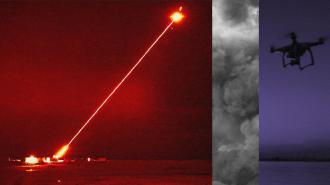UK’s “DragonFire” laser weapon downs its first drones
A high-powered laser weapon under development in the UK just shot down its first drones — putting the futuristic device a major step closer to the battlefield.
The background: Laser weapons — powerful, destructive beams of light — are arguably the “next big thing” in defense tech, thanks to their numerous benefits over traditional kinetic energy weapons, like missiles or guns.
“DragonFire will be a vital British weapon as the threat of drone warfare grows.”
Grant Shapps
Even though laser weapons cost a lot to develop, their per-shot cost can be as low as $1 — a single missile can carry a price tag of more than $1 million. Because a laser weapon doesn’t have physical projectiles, there’s never a worry about running out of ammo, either — it can fire as long as it has an energy source.
The beam of a laser weapon moves at the speed of light, too, so there’s almost no delay between when it’s fired and when it reaches its target — that makes it easier to hit moving targets, like drones or incoming missiles, than if you were using a kinetic energy weapon.
What’s new? In 2017, the UK military began developing DragonFire, its first high-powered, long-range laser weapon, and on January 19, it demonstrated the device’s ability to down aerial drones for the first time.
“Capable of being fitted to future warships, [DragonFire] will be a vital British weapon as the threat of drone warfare grows,” tweeted Grant Shapps, the UK’s secretary of state for defense, after the demonstration.
Looking ahead: Both the UK Army and Royal Navy are considering adding DragonFire to their air defense arsenals, and a spokesperson from the UK’s Defence Science and Technology Laboratory told Defense Now that it could be ready for deployment in 5 to 10 years.
“The DragonFire system has been successfully proven to date, and we are now closer than ever to having a unique weapon that will enable frontline commands to meet the rapidly changing threats they face,” said Chris Allam, managing director at MBDA UK, an industry partner on the DragonFire project.
We’d love to hear from you! If you have a comment about this article or if you have a tip for a future Freethink story, please email us at tips@freethink.com.
